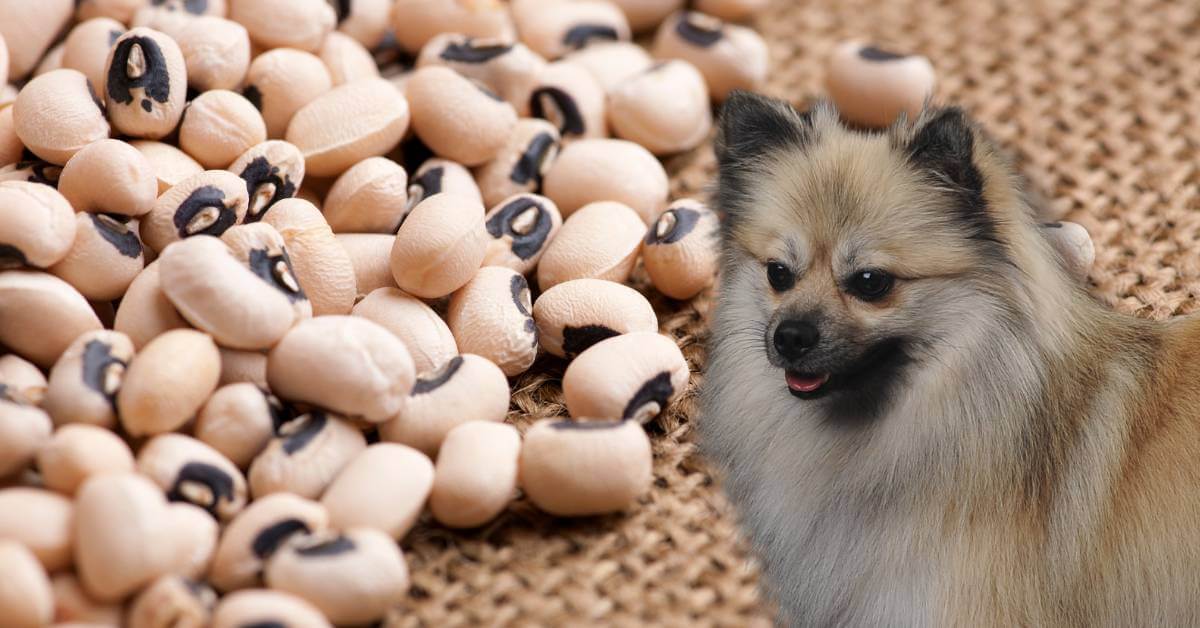Can Dogs Eat Black-Eyed Peas?
Black-eyed peas are an amazing food and one of the cooking staples in our kitchen. But when it comes to feeding your dogs’ black-eyed peas, we advise you only to include them in moderation and prepare them in a very simple way! Black-eyed peas can be a good meal topper but not a main dish. It’s highly unlikely that your dog will ever want to eat black-eyed peas, but hey, we’re not judging!

While black-eyed peas are a rich source of fiber and protein, some dogs may be sensitive to them and have an upset stomach. So, proceed with caution, and if they like it, then go for it. They can be a great addition to home-cooked meals that you can share with your dogs, but only if you make them without all the fancy spices and seasonings.
Let’s dive a little bit deeper into black-eyed peas nutrition and learn about the benefits of including them in your dog’s diet.
Is it safe for dogs to eat black-eyed peas?
There’s a distinction between non-toxic and safe to eat, right? How can we tell if black-eyed peas are safe for dogs and if they can easily digest legumes?
Well, we found an amazing study about the use of legumes and other plant-based proteins in dogs’ diets. Researchers formulated five different dog foods, each with a unique primary protein source: garbanzo beans, green lentils, peanut flour, dried yeast, or the standard poultry by-product meal.
They fed these diets to ten adult beagles over a series of 14-day periods, closely monitoring their health, digestion, and poop (yes, poop tells us a lot about health!). The great news? All the dogs stayed healthy, their blood tests returned normal, and their stools were just right, indicating that these alternative proteins didn’t mess with their digestive systems.
Digging deeper into the results, it turns out that the digestibility of these novel diets was pretty high, over 80%! This means that dogs can efficiently extract nutrients from these foods. Interestingly, the diets with plant-based proteins led to higher levels of certain beneficial fatty acids in the dogs’ poop compared to the conventional poultry-based diet.
So, now that you know that dogs can digest legumes and make the most of nutrients, let’s explore some nutritional benefits.
Nutritional health benefits of black-eyed peas for dogs
Black-eyed peas are rich in healthy nutrients. Let’s delve into what makes these legumes a healthy choice for our furry friends:
How to feed your dog black-eyed peas?
Feeding your dog black-eyed peas involves a few simple steps to ensure it’s safe and beneficial for their health. First, it’s crucial to cook the black-eyed peas plainly, without adding any salt, spices, or seasonings that could harm your dog.
Introduce them slowly! Moderation is key when introducing them to your dog’s diet to avoid any potential gastrointestinal upset. Always ensure the black-eyed peas are fully cooked, as raw or undercooked peas can be difficult for dogs to digest. To help your dog get used to this new food, consider mixing a small amount of black-eyed peas with their regular food.
Don’t give your dog canned black-eyed peas (if you can avoid it)
Canned black-eyed peas often contain added salt and preservatives, which are unsuitable for your dog’s health. Opting for dry black-eyed peas that you cook yourself is the best way to control what goes into your dog’s food and ensure it’s as healthy as possible. We don’t know if and how much the preservatives from canned food can harm your dog, but still, it’s better to avoid the risk.
Hopefully, we helped and shared more insight, so next time you do your meal prep, you can set aside some unseasoned black-eyed peas and top up your dog’s favorite meal!
Love, life, and fur forever!

FAQs
Can dogs eat cooked black-eyed peas?
Yes, dogs can eat cooked black-eyed peas in moderation. Ensure they are prepared plainly, without any added salt, spices, or seasonings.
Can dogs eat black-eyed peas and rice?
Dogs can safely eat black-eyed peas and rice as long as both are cooked simply without any harmful additives. This combination can provide a healthy, moderate addition to their diet.
Can dogs eat canned black-eyed peas?
It’s best to avoid feeding dogs canned black-eyed peas due to the added salt and preservatives, which can be harmful to their health. Opt for plain, cooked black-eyed peas prepared at home instead.